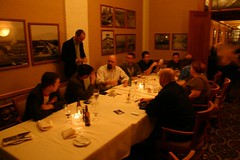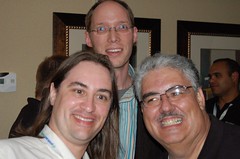First Crack 86. Busting the 12-Step Cycle
The first crack at the new, fully-automated publication process.
![]() Listen to Busting the 12-Step Cycle [2 min]
Listen to Busting the 12-Step Cycle [2 min]
(This podcast brought to you by HijackingWP)
“Statistically Nobody is Listening to Your Podcast”
(emphasis mine.)
70 is a great number. It’s not a number that makes sense for advertisers – it’s statistically zero (credit to Dave Slusher for the quote titling this post). Well, until we can accurately measure influence and caring.
“But it is a number that can find your friends, like thinkers and make you feel that you are talking to more than 3 people.” – Kris Smith.
Exactly. Mass voicemail.
Related:
“”The average blog has exactly one reader: the blogger.” – Eric Schmidt, CEO Google, via Jeff Jarvis
This is a Test Post Using Applescript
Not much more to say. Things really shouldn’t look different on your end.
Severe Cold Alert
Monday night, I stopped by the Target cold and flu aisle on the way home from the Emerging Digerati presentation.
I’m thankful that cold remedy makers put they symptoms on the box front; body ache, sore throat, fever, headache.
Tuesday, all the symptoms were turned up to 11. The few conversations I had, were hastily rescheduled between my few awake moments.
If I missed you, I’m sorry. It’s better I wasn’t there.
Things are improving. I just might be back to normal tomorrow.
Shure is Quiet in Here: A Review of the E2c-n Sound Isolating Earphones
Noticing I get more work done with headphones on and music drowning out the rest of the world, I picked up a pair of Shure E2c-n Sound Isolating Earphones – thinking I wouldn’t need the music up so loud.
I don’t know how I could have handled airplane travel without them. The rest of the world is muffled away. Even with nothing playing, they turn the world down a couple notches. All the ambient noise of the cabin – fans, air, all of it gone. The screaming baby directly behind me? I barely know it’s there.
Ahhhh. Quiet.
They came with a number of different inserts, I found the orange foam ones most comfortable. Though, I still haven’t found the perfect position for them. With the iPod ear buds, I could just set them in and go. The Shure’s need a little wiggling before they’re comfortable and then, a little more wiggling after a while.
First Crack 85. Jeremy Messersmith Talking about the Alcatrez Kid
Here’s my long-awaited conversation with Jeremy Messersmith talking about his new album, the Alcatraz Kid ($13.00 PayPal, City Pages review, Pulse review), and playing a couple of the songs of from it – two of my favorites (Day Job, Snow Day) and one of Jeremy’s (Great Times).
![]() Listen to Jeremy Messersmith Talking about the Alcatrez Kid [15 min]
Listen to Jeremy Messersmith Talking about the Alcatrez Kid [15 min]
Slow Marketing
“slow marketing is a focus on human, one-on-one connections” – Evelyn Rodriguez
The great thing about technologies like RSS, is their low-committment persistence, their bias for – as Evelyn calls it – ‘slow marketing’.
For example, take real estate. It’s a big purchase occurring infrequently. Most of the time, I’m not looking for or buying a house. Having an RSS feed in my subscriptions continually reminds me of the voices and people I trust – continually in a very non-distractive manner.
The longer term horizon on this is refreshing.
Photo of Me at PodcastExpo

(Me, Kris Smith, Rick Klau, Eric Olson, and many others at Dinner)
Big thanks go out to;
- Kris Smith – for letting me hang out with him all weekend and running the best session of the conference.
- Tim Coyne – for some amazing conversation.
- Dave Slusher – for dropping zen wisdom all weekend (“there is no good and bad – only relevant to you or irrelevant”, “statistically nobody is listening to your podcast”) and hosting a great BBQ.
I completely agree with Tim Elliott’s and impression of the event:
“I was a bit disappointed in the lack of advancement in the podcasting world over the past year.”
Tim’s right, it isn’t just in the vendors. As a community, the most vocal podcasters are still stuck on the same questions: the name of the thing, measuring success/value, justifying their continued involvement. Disheartening.
I made a number of laps around the expo floor over the 2 days – generally stalling out at the LA Podcasters booth and chatting with Tim Coyne. The other booths seemed to be selling one of the following;
- Stuff I already have that works great
- Stuff I won’t ever use
- Stuff that doesn’t make sense
- Snake oil
I left thinking there are 3 problems with the expo as it exists currently;
- It’s serving 2 separate cultures; those that love podcasting and those that missed the first dot com rush
- It’s too niche. As evidence by the expo floor, there’s just not enough innovation happening within the podcasting-specific space year over year to be interesting. Now, if the context was expanded just a hair to anything-RSS we’d start to see far more interesting things. Plus, it’d give larger media brands a better justification for attending.
- Too many logos with the word ‘pod’ in a different color than the rest of the company name.
What’s the Future of Media Networks?
PodcastMN.com pulls 70+ podcasts in to a single page using a single script.
Is it a network? I hope not.
But it does many of the same functions as a media network (ABC, BBC, NBC, etc); aggregate and present a collection of voices with some common collection of attributes.
While other functions – distribution, production, bandwidth – are handled by the individual podcasters themselves. Is that what makes a network?
To paraphrase – we are all network programmers of each other.
I call this collection of focused, attribute-based re-syndication a lazy networks
“Two podcasters can’t stand next to each other without it being a network” – Dan Klass


